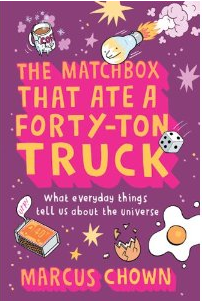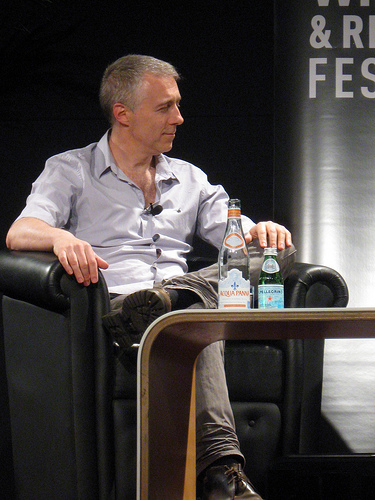What Everyday Objects Tell Us About the Universe
01 JUNE, 2010 by Maria PopovaWhy your reflection is a matter of chance, or how to fit everything that ever existed on a USB stick.
 We recently raved about an excellent article about the early history of the universe, quantum reality and the origins of information. Turns out its author, California Institute of Technology astronomer and New Scientist cosmology consultant Marcus Chown, didn't stop there.
We recently raved about an excellent article about the early history of the universe, quantum reality and the origins of information. Turns out its author, California Institute of Technology astronomer and New Scientist cosmology consultant Marcus Chown, didn't stop there.
His new book, The Matchbox That Ate a Forty-Ton Truck, offers a fascinating anthology of wisdom bites about the universe gleaned from everyday objects.
Today, we sit down with Marcus to probe into some of the book's peculiar contentions and quench our curiosity about just how one comes to see quantum theory in bananas.

If the Sun were made of bananas it wouldn't make much difference

How did the inspiration for the book come? Was it a single "a-ha!" moment, an encounter with a particular mundane object that gleaned surprising revelation about something much larger, or was it more of a buildup of insights?
 Marcus Chown: While doing publicity, I tend to latch onto everyday observations and relate them to deep physics. Recently, I wanted to highlight the paradox that spawned quantum theory. So I drew people's attention to a light bulb and pointed out the light waves coming out are about 5000 times bigger than the atoms. "Say, I opened this matchbox", I said, "and out drove a 40-tonne truck. That's what it's like for light streaming out of that light bulb." And one day, a light bulb did go on in my head. I thought, why don't I write a book about what everyday things tell us about the Universe?
Marcus Chown: While doing publicity, I tend to latch onto everyday observations and relate them to deep physics. Recently, I wanted to highlight the paradox that spawned quantum theory. So I drew people's attention to a light bulb and pointed out the light waves coming out are about 5000 times bigger than the atoms. "Say, I opened this matchbox", I said, "and out drove a 40-tonne truck. That's what it's like for light streaming out of that light bulb." And one day, a light bulb did go on in my head. I thought, why don't I write a book about what everyday things tell us about the Universe?

Tea cups break rather than unbreak because the universe is expanding in the aftermath of the big bang

What's your favorite mundane-object-turned-quantum-oracle?
MC: It still amazes me that something as mundane and everyday as your face reflected in a window tells you about the most shocking discovery in the history of science — that the universe is founded on random chance, the roll of a quantum dice, that ultimately things happen for no reason at all. Einstein was so appalled by this that he famously declared "God does not play dice with the Universe".
The irony is that not only does God play dice but, if He did not, there would be no universe of the beauty and complexity we find ourselves in.

Reflection in a window shows that universe based on random chance
Marcus Chown, Serpentine, London, January 2007. Image by Jorn Tomter

Historically, humanity's beliefs about the universe have regularly turned out to be tragicomically misguided. With what degree of certainty do you foresee the ideas outlined in your book surviving the test of time and scientific evolution?
MC: Well, of course, science is provisional. It is the best description we have of the world at this moment in time. Scientists are always looking for observations that will falsify their theories in their quest to lay bare ever deeper layers of reality. But, even though we know Einstein's theory of gravity, for instance, is not the last word – because it breaks down inside black holes and in the big bang — we know it contains profound truth. And that's what I think about the ideas in my book. Most are likely to be modified and extended in the fullness of time but they nevertheless contain a large amount of truth.

You could fit the information for a million universes on a 1Gb flash memory

Howard Gardner's theory of multiple intelligences is a favorite here at Brain Pickings, and a recent New York Times article outlined a similar theory of differences in creative capacity. Do you think this associative ability to look at the mundane and extrapolate the omnipotent is a unique kind of mental wiring, a mark of scientific genius shared necessary for groundbreaking discovery and shared by history's most iconic scientists? Or is it something we can learn to do?
MC: Of course, this is what scientists do. They try to tease out the general, unifying principles which underlie as wide a range of phenomena as possible. Darwin, for instance, in one of the greatest strokes of genius in history, saw the driving principle — evolution by natural selection – that was generating the bewildering complexity of the natural world. This kind of thing – extrapolating from the specific to the general — is very hard. But I don't believe it is special to geniuses (I don't think much is special to geniuses!). Anyone can learn. It's just that most of us don't practice much!

The iron in your blood was created in stellar explosions like this one, NASA
 To test yourself against some of the surprising factoids and curiosities in The Matchbox That Ate a Forty-Ton Truck, take a stab at this quiz, answers below. For more about the how's and why's of the answers, do grab a copy of the book — we guarnatee you won't be disappointed.
To test yourself against some of the surprising factoids and curiosities in The Matchbox That Ate a Forty-Ton Truck, take a stab at this quiz, answers below. For more about the how's and why's of the answers, do grab a copy of the book — we guarnatee you won't be disappointed.
1. If all the empty space were squeezed out of matter, the human race could fit in:
- Wembley Stadium?
- The area of the Isle of Wight?
- The volume of a sugar cube?
2. Einstein famously said:
- God does not play roulette with the Universe
- God does not play dice with the Universe
- God does not play poker with the Universe
3. The faster you travel:
- The taller you get
- The slimmer you get
- The lighter you get
4. The best place to look for evidence of the big bang in which the Universe was born is:
- On your TV
- In your washing machine
- At the Greenwich Meridian
5. Most of the Universe gives is currently invisible to our telescopes – but how much?
- 1%
- 50%
- 98%
6. The scientists who won the Nobel prize for detecting the faint "afterglow" of the big bang thought they had found:
- the glow of pigeon droppings
- the glow of street lights
- the glow of glow worms
7. Einstein's mathematics professor called him a:
- lazy possum
- lazy dingo
- lazy dog
8. Today's sunlight was made:
- 30,000 years ago
- 300 minutes ago
- 3 seconds ago
9. Aged 16, Einstein came up with the idea of relativity after wondering what it might be like to travel on a:
- sound wave
- light wave
- steam train
9. The first time anyone eve saw an atom was in:
- 1980
- 1880
- 5 BC
Answers: 1C, 2B, 3B, 4A, 5C, 6A, 7C, 8A, 9B, 10A
 Brain Pickings has a free weekly newsletter and people say it's cool. It comes out on Sundays and offers the week's best articles. Here's an example. Like? Sign up.
Brain Pickings has a free weekly newsletter and people say it's cool. It comes out on Sundays and offers the week's best articles. Here's an example. Like? Sign up.

No comments:
Post a Comment